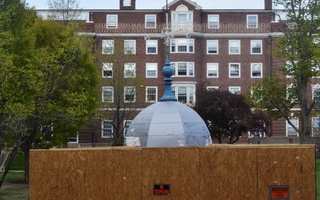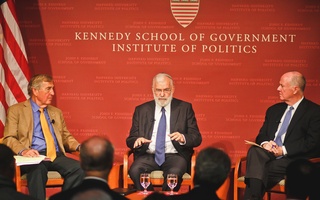The doctors attempted to put aside the political debate surrounding the presence of American aid workers in Iran.
“We were apolitical. We were there for the disaster,” Goodman said. “There were tons of media...but that wasn’t really our issue. We were there for the people who were wounded.”
Security, though, was a major concern, according to Briggs.
“There were hardliners who felt that we shouldn’t be there. [Bam] is an area with a lot of drugs in the region,” Briggs said.
And in the aftermath of the earthquake, there also has been rampant looting.
Nevertheless, Goodman, Waltzman, and Briggs said they encountered no hostility from the Iranian people or government officials. The Iranian military guarded all the field hospitals in the disaster area, many of which were from other foreign countries, including the Ukraine, Denmark, China and Algeria.
“None of us worried about our safety because if we did worry about it, we wouldn’t have gone,” Waltzman said.
The medical specialists had to cope with cultural differences as well.
“You saw us with bandannas that were made from arm slings,” Briggs said. “You never had an uncovered head.”
The Iranians also found it surprising that Briggs headed the relief team because she was a woman, Briggs said.
The team had to tailor its treatment to be respectful of gender divisions as well.
“The biggest difference was that we had to segregate males and females, which was a big logistical difficulty for us,” especially in the treatment of patients with minor injuries, Briggs said. According to cultural tradition, male and female patients cannot receive care in the same area.
Moreover, none of the doctors spoke Farsi, the official language of Iran, and instead relied on the use of translators, many of whom were students from Tehran University. The language barrier proved especially difficult in cases of psychological trauma.
“We had one child who was an emotional wreck, because he kept seeing people pulling members of his family dead out of the rubble, and he was having nightmares of that,” Waltzman said. The disaster relief team was trained to provide immediate medical treatment and was not specifically prepared to provide psychological help, especially through translation.
According to Briggs, the Iranians “set up tents for psychological counseling with people who spoke the language.”
Read more in News
Chapel May Remain in Cambridge PermanentlyRecommended Articles
-
Few Dorms Use Full ParietalsFew Radcliffe dorms have voted to accept the maximum number of parietal hours permitted by a recent RGA decision. Barnard
-
Quaker Racquetmen Take Six-Man Title(Special to the CRIMSON) WILLIAMSTOWN, Mass., March 7-Penn's varsity squash team won four consecutive head-to-head matches with the Crimson Saturday
-
Cindermen Compete in N. Y. Millrose Meet and StadiumThe Crimson Varsity track forces swing into action today with the Millrose Games at New York, and the New England
-
Colossal Mountains on the Eve of LifeAnd what is the best life? Attempting to answer that would be, say, like trying to climb a mountain for the sake of climbing a mountain.
-
 Cabot House to Place Time Capsule in Cupola
Cabot House to Place Time Capsule in Cupola -
 Forum Looks at Approaches to ISIS, Iran
Forum Looks at Approaches to ISIS, Iran













